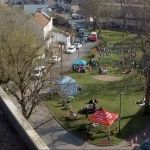Eat Well Live Well
In a village in North Somerset, school children are working with a number of community groups to learn about growing their own food and cooking with surplus food from local supermarkets. The Eat Well Live Well project is bringing a range of community groups together to support children from the village of Pill as they learn how their eating habits impacts their health and the environment.
Country
Media
* TOP TIP *
Contact local shops to see if they are willing to donate some surplus food to you. Its doesn’t need to be a regular supply. Just one or two donations will be enough to demonstrate the concept of food waste. Use this food to develop an education session that looks at food waste and climate change.
How is the project linked to climate change and sustainability?
As part of the project, the children are linking with the ‘Pill & District Community Fridge’ project. This project receives surplus food from local supermarkets and re-distributes it to everyone in the local community. Between June 2021 and February 2022, the project stopped three and a half tonnes of food from going into the bin. When we waste food, we also waste the energy and water that it takes to grow, harvest, transport, and package it. Also, if food goes to the landfill and rots, it produces methane—a greenhouse gas even more potent than carbon dioxide. About 6%-8% of all human-caused greenhouse gas emissions could be reduced if we stop wasting food. The Eat Well, Live Well project has received funding to buy a freezer which they will use to prepare and freeze the food surplus, which will then be used in their cooking.
Who is involved?
The project aims to work with children of school age from the village. They will be supported by the allotment association, the community centre, the Pill Youth Club, local residents, members of the Sustainable Pill and District (SPAD) group, the ‘Pill & District Community Fridge’ project, a local chef and the Lunch Club.
How are the participants involved?
The children will work with the local allotment association, who have provided a space for the children to plant and grow their own fruit and vegetables which will be used in food preparation. Local members of the community will also work with the children to erect a poly tunnel which has been bought with the funding.
Local residents will be installing brand new cooking facilities in the Youth Club space in the community centre. This space will be the focus of the cooking activities. A local chef will teach the children cooking skills and all of the food they have grown and sourced from the community fridge project will be prepared and cooked here. Educational sessions will be run alongside the cooking so that the children can learn about healthy and sustainable eating. As part of these sessions, they will learn about nutrition, seasonality, local food production, food miles and food waste.
The final part of the project will work towards putting on a ‘cook and share’ session as they get together with elderly members of Pill and district’s lunch club. The children will put on a food themed event for the club and develop intergenerational links as they learn about traditional methods of food preparation from the elderly members.
Key steps
- Identify which local groups in your community might be interested in supporting your food project. The local allotment association is a good place to start and they may well be happy to provide your school with a space for growing.
- Put a call out to the local community. Is there a local chef who may be willing to run a few cooking sessions for you?
- Contact local shops to see if they are willing to donate some surplus food to you. It doesn’t need to be a regular supply. Just one or two donations will be enough to demonstrate the concept of food waste. Use this food to develop an education session that looks at food waste and climate change.
- Link with your local care setting or lunch club and invite them to your food themed event at the end of the project.

